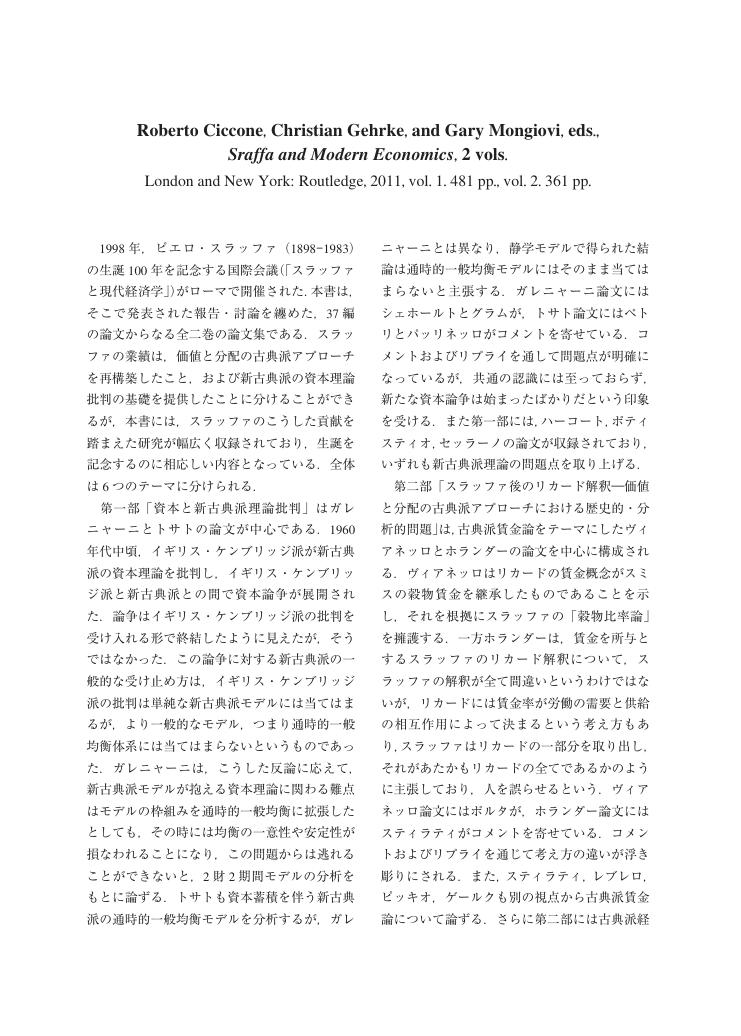1 0 0 0 OA 菱山泉訳 スラッファ『経済学における古典と近代』
- 著者
- 菱山 泉 宮本 順介 Robert Chapeskie
- 出版者
- The Japanease Society for the History of Economic Thought
- 雑誌
- 経済学史研究 (ISSN:18803164)
- 巻号頁・発行日
- vol.60, no.2, pp.42-96, 2019 (Released:2019-09-04)
Introduction by Junsuke Miyamoto In 1956 Izumi Hishiyama and Yoshihiro Taguchi translated two essays by Piero Sraffa, ʻSulle relazioni fra costo e quantità prodottaʼ (1925) and ʻThe Laws of Returns under Competitive Conditionsʼ (1926), and published them, with the addition of commentary by Hishiyama, as Keizaigaku ni okeru Koten to Kindai-Shinkotengakuha no Kentō to Dokusenriron no Tenkai (The Classical and the Modern in Economics: The Examination of the Neoclassical School and the Development of Monopoly Theory, Tokyo: Yuhikaku) in the same year. It is the commentary by Hishiyama included in this book, ʻSraffaʼs Position in the History of Economic Thought and the Significance of his Study of Ricardo,ʼ that has been translated into English here. Izumi Hishiyama (1923-2007) began his work as a scholar with the study of François Quesnayʼs tableau économique, and the results of these efforts were brought together in ʻThe Tableau Économique of Quesnay: Its Analysis, Recon-struction and Applicationʼ (Kyoto University Economic Review, April 1960). This work received international acclaim as the first thoroughgoing attempt at a dynamic treatment of the tableau économique model. Later, Hishiyama en-countered Sraffaʼs essay ʻSulle relazioni fra costo e quantità prodotta,ʼ which made a profound impression on him, and through the intermediary of Sraffa developed an interest in classical school economics centred on David Ricardo, on the one hand, and the economics of Alfred Marshall and the Cambridge school, on the other. On the basis of an approach that involved reviving the ideas of the classical school in modern economics, Hishiyama presented a large amount of excellent research ranging from the economics of the classical school to the economics of his day. He is renowned in particular as a pioneer of Sraffian economics in Japan, and in 1962 published, together with Hiroshi Yamashita as his co-translator, a groundbreaking Japanese translation of Production of Commodities by Means of Commodities: Prelude to a Critique of Economic Theory (1960), one of Sraffaʼs most important works. In 1993 he published Sraffa Keizaigaku no Gendaiteki Hyōka (A Modern Evaluation of Sraffian Economics, Kyoto: Kyoto University Press), a text that can be described as one of his most significant works, in which he considered Sraffaʼs economics from a multi-layered perspective and attempted to establish his contribution to modern economics.
- 著者
- 宮本 順介
- 出版者
- 経済学史学会
- 雑誌
- 経済学史研究 (ISSN:18803164)
- 巻号頁・発行日
- vol.59, no.2, pp.189-190, 2018 (Released:2019-10-12)
- 著者
- 宮本 順介
- 出版者
- 経済学史学会
- 雑誌
- 経済学史研究 (ISSN:18803164)
- 巻号頁・発行日
- vol.55, no.1, pp.108-109, 2013 (Released:2019-11-27)

